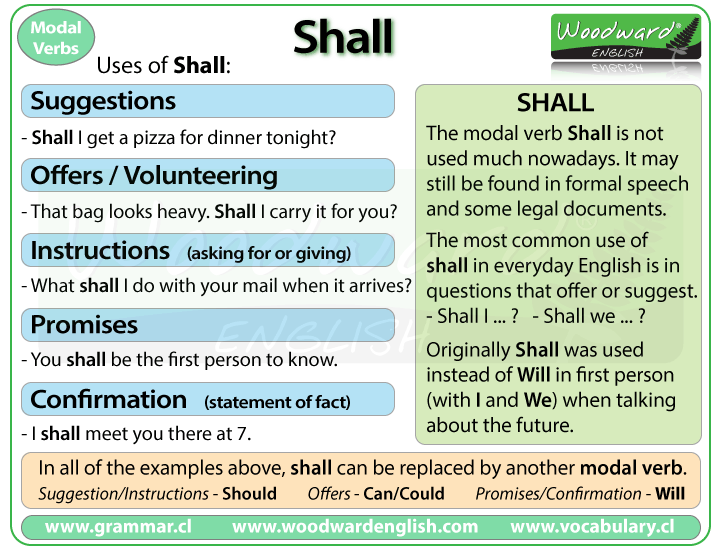
auxiliary verb, present singular 1st person shall, 2nd shall or (Archaic) shalt, 3rd shall, present plural shall; past singular 1st person should, 2nd should or (Archaic) shouldst or should·est, 3rd should, past plural should; imperative, infinitive, and participles lacking.
- plan to, intend to, or expect to: I shall go later.
- will have to, is determined to, or definitely will: You shall do it. He shall do it.
- (in laws, directives, etc.) must; is or are obliged to: The meetings of the council shall be public.
- (used interrogatively in questions, often in invitations): Shall we go?
verb past should (takes an infinitive without to or an implied infinitive)
- (esp with I or we as subject) used as an auxiliary to make the future tensewe shall see you tomorrow Compare will 1 (def. 1)
- (with you, he, she, it, they, or a noun as subject)
- used as an auxiliary to indicate determination on the part of the speaker, as in issuing a threatyou shall pay for this!
- used as an auxiliary to indicate compulsion, now esp in official documentsthe Tenant shall return the keys to the Landlord
- used as an auxiliary to indicate certainty or inevitabilityour day shall come
- (with any noun or pronoun as subject, esp in conditional clauses or clauses expressing doubt) used as an auxiliary to indicate nonspecific futurityI don’t think I shall ever see her again; he doubts whether he shall be in tomorrow
v.Old English sceal, Northumbrian scule “I owe/he owes, will have to, ought to, must” (infinitive sculan, past tense sceolde), a common Germanic preterite-present verb (along with can, may, will), from Proto-Germanic *skal- (cf. Old Saxon sculan, Old Frisian skil, Old Norse and Swedish skola, Middle Dutch sullen, Old High German solan, German sollen, Gothic skulan “to owe, be under obligation;” related via past tense form to Old English scyld “guilt,” German Schuld “guilt, debt;” also Old Norse Skuld, name of one of the Norns), from PIE root *skel- (2) “to be under an obligation.” Ground sense of the Germanic word probably is “I owe,” hence “I ought.” The sense shifted in Middle English from a notion of “obligation” to include “futurity.” Its past tense form has become should (q.v.). Cognates outside Germanic are Lithuanian skeleti “to be guilty,” skilti “to get into debt;” Old Prussian skallisnan “duty,” skellants “guilty.”
 Liberal Dictionary English Dictionary
Liberal Dictionary English Dictionary